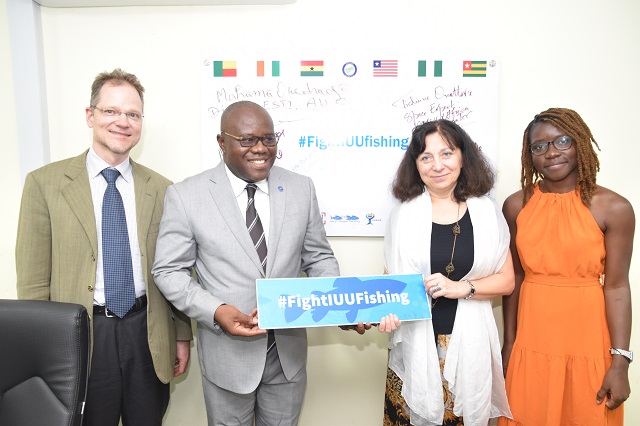Director-General of the Directorate-General for Maritime Affairs and Fisheries of the European Commission, Ms. Charlina Vitcheva, has called for more commitment from the Ghanaian government and fisheries sector stakeholders to tackle a harmful practice of illegal, unreported and unreported (IUU) fishing, popularly termed “saiko”.
Speaking to journalists after a visit to the Regional MCS Centre of the Secretariat of the Fisheries Committee of West Central Gulf of Guinea (FCWC) in Tema, she said that the menace of IUU fishing is a damaging practice that leads to overfishing, which depletes the fish stock, and places the livelihoods of coastal dwellers at risk.
“IUU fishing destroys the marine ecosystem because the illegal practice is done with gears and methods that are very harmful and destructive.
It also plays against normal competition in the fisheries sector and undermines the livelihoods of coastal communities; so, the practice has dire effect on the various stakeholders within the value chain,” she indicated.
Ghana has received “yellow card” from the European Union (EU) for persistent IUU fishing activities within its waters due largely to the perceived lack of willingness to steer the its fisheries sector processes towards improvement. However, according to Ms. Vitcheva, there is now increasing commitment on the part of government to do something to reverse the situation.
The EU fisheries head admitted that there have been some brave actions from the government since the start of this year, and added that the yellow card will be revoked when the various conditions that prompted its application have been duly addressed.
“We want to give the government and fisheries stakeholders some space to act [and] the EU will be looking very diligently into achieving progress […] to offer the needed assistance to accompany those reforms or necessary changes,” she further stated.
She however explained that the idea behind the yellow card is not to place sanctions but to rather promote prevention and to offer help towards the fight against the IUU menace.
“We want to provoke reforms where it is needed and steer the decision-making process in the fight against IUU fishing. There should be fisheries management measures that will protect juvenile fish and keep them in a healthy state,” she stressed.
Ms. Vitcheva indicated that the EU was very much in favour of clams fishing which has high economic importance in terms of revenue generation and job creation in the fisheries sector aside being a source of healthy diets.
“We find clams fishing very important from our experts and we consider that co-management is actually the right way forward,” she noted.
The purposes of the visit to the FCWC were to discuss bilateral cooperation and to review the achievements of the FCWC in its implementation of the EU-funded Improved Regional Fisheries Governance (PESCAO) project.
